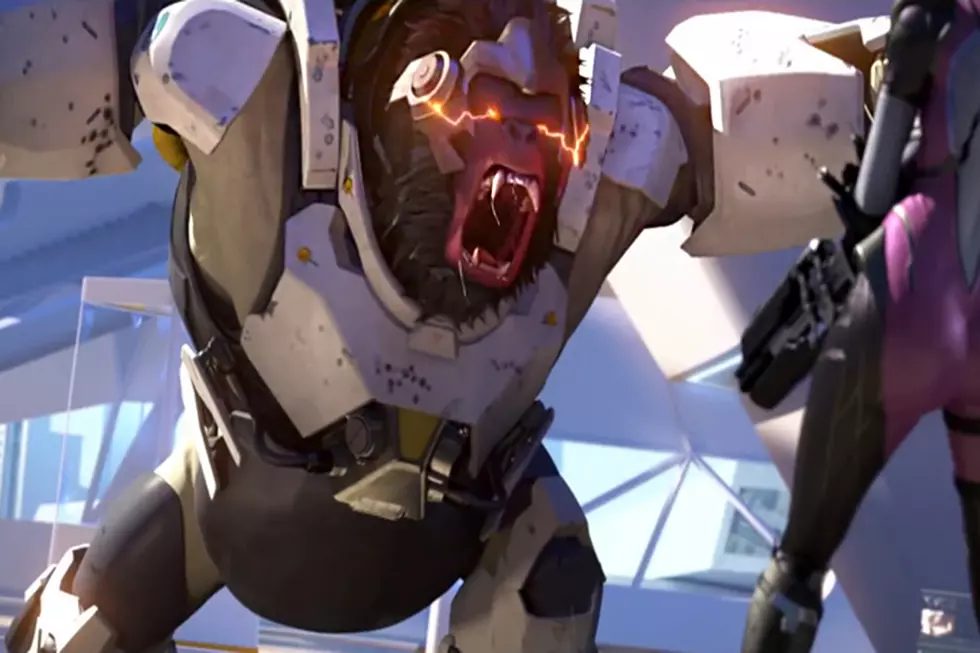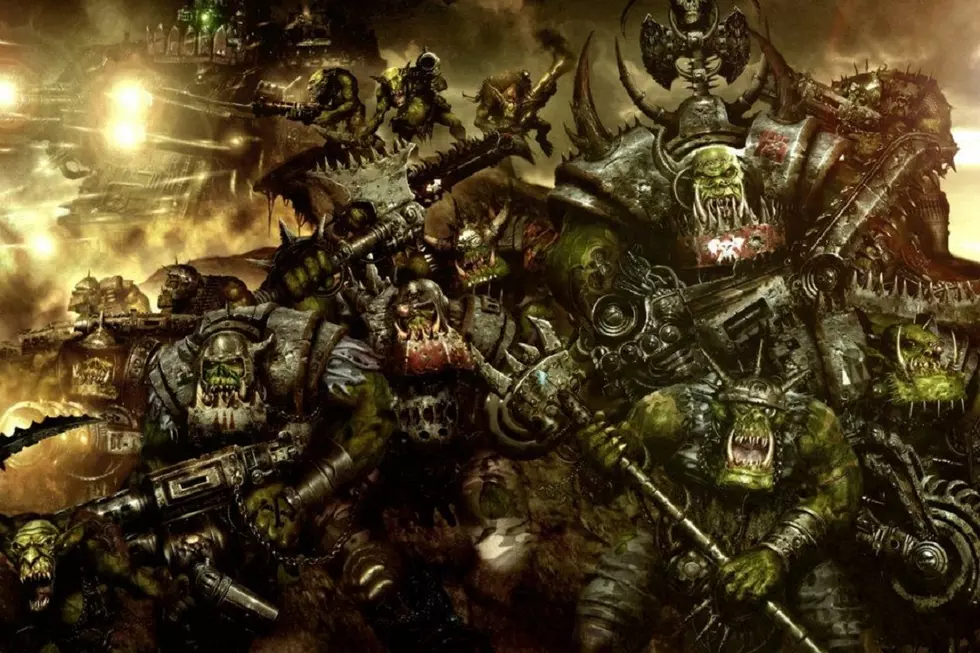
The History of Blizzard: Vikings, Crafts, and One Mad Gorilla
Blizzard's name is an aptly-chosen one; this titanic game company is famous for its glacial development pace. New Blizzard projects usually have lengthy gaps between them, with release dates rarely getting mentioned until the product is finished and ready to ship. While it can be frustrating for fans to have to wait interminably long, this relaxed speed brings with it a creative atmosphere and quality games— as Shigeru Miyamoto so famously said, "A delayed game is eventually good. A bad game is bad forever."
Overwatch marks the newest entry in the Blizzard library (and their first all-new intellectual property in over a decade), so let's take a moment to go back through the brightest points in the history of these legendary game-makers to better understand why their newest game garners such eager anticipation.
Early Blizzard
Notable Titles: The Lost Vikings, Rock 'N Roll Racing, Blackthorne, Justice League Task Force
As Silicon & Synapse, the pre-Blizzard team made a few noteworthy titles such as The Lost Vikings, a clever SNES puzzle-platformer, and the Mario Kart-esque Rock 'N Roll Racing. The group then transformed from Silicon & Synapse into Blizzard, creating the cinematic platformer Blackthorne and Justice League Task Force, a fighting game pitting DC Comics greatest heroes against each other. Despite shining bits of promise here and there, these early titles went relatively unnoticed by the gaming community at large. It wasn't until Blizzard shifted its focus onto PC gaming that they really hit their stride.
Warcraft & Warcraft II
While there were plenty of great strategy games before Warcraft, most of them were quieter, slower affairs, lacking the flash and fun to really break out into the mainstream. Then along comes Warcraft, which lets you create vast armies to crush your foes with --- for the time. An army of twelve isn't much of an army by modern RTS standards. It was simple, but engaging, and colorful enough to draw in veterans and newcomers alike, going on to receive both critical and financial success.
Warcraft II built on Warcraft's framework and surpassed it in every way, with vastly superior strategic options, user interface, graphics, customization, and story. Warcraft put Blizzard on the map, but Warcraft II solidified its place there.
Diablo
With its dark catacombs, foreboding atmosphere, and addictive gameplay, Diablo is largely responsible for the creation of the Dungeon Crawler, a genre of games which focus primarily on sending players through deadly dungeons in search of loot and glory. Matt Uelmen’s soundtrack haunts your every step, giving your quiet adventures an eerie, epic feel; the Tristram town theme is often regarded as one of the greatest tracks in video game history. Diablo also broke new ground by integrating multiplayer in a way that made it easy to play with friends or strangers. You could work together to take down the evil haunting Sanctuary, slaughter other players in deadly duels, or troll noobs with lies about the mythic “cow level” only accessible by harassing NPC cows. Diablo’s randomly-generated adventures and inspired setting engendered a strong sense of community in its playerbase, and Blizzard intelligently established an accessible framework for this community through the multiplayer hub Battle.net, which then helped set the stage for its next big success.
Starcraft/Starcraft: Brood War
Depth vs. Complexity is an eternal struggle for game developers. You want your games to be as simple as possible to ease in new players, but with enough depth to keep veterans playing. Starcraft hit the perfect balance of Depth vs. Complexity, streamlining most of the overly-complex upgrades and economy-oriented gameplay elements of past RTS games, instead focusing on getting players moving, thinking, and reacting faster than they ever had before. Combine this blazing gameplay with three well-balanced, but incredibly different, playable factions and suddenly you've got a game of lightning chess that's understandable no matter where you're from. Starcraft became a global phenomenon, something still played in competitive, professional circles to this day.
Diablo II/Diablo II: Lord of Destruction
If Diablo was what helped create the Dungeon Crawler, Diablo II transformed it into something epic. This is one of the best sequels of all time, taking everything that was great about the original while expanding and innovating. Diablo II invented skill trees, for crying out loud; countless games today still rely on that tried-and-true character progression system. Ultimately, Diablo II works because it has so many different ways to play it thanks to its robust cast of characters, and the flexible loot system means that, no matter how powerful you are, there's always some other cool thing out there for you to find (which is probably why it’s still getting played and updated to this day).
Warcraft III/Warcraft III: The Frozen Throne
Always looking to innovate, Blizzard’s new RTS broke away from the massive, multi-unit engagements of Starcraft through the inclusion of Hero Units— powerful characters who gained experience over the course of a match and whose powers could make or break a battle. These hero units made it easier for Warcraft III to tell an epic story, giving a personal element to each level which was missing from many previous games. Blizzard often includes robust editing tools with their games, and though the editors on games past offered a wide variety of options to players, none were as robust as Warcraft III's editor. Thanks to its inclusion, an innocuous mod titled Defense of the Ancients came to be, and through it the genre of MOBA was created.
World of Warcraft
In its heyday, World of Warcraft had over twelve million subscribed players. Even today it has a playerbase that's a 100 times larger than plenty of other healthy, sustainable MMOs, all because it started on, and continued building on, an incredibly strong foundation. WoW's earliest days were riddled with gameplay choices which seem backwards and unintuitive from a modern perspective (Remember raid attunements, weapon skills, or the hell of trying to be a ret/prot pally in vanilla?) it did so many things so much better than the other MMOs of the time that it couldn't help but be propelled to stardom. It was faster, sleeker, more intuitive, more fun than the other MMOs, and hit at a time where the internet was becoming progressively easier to access. With each expansion pack Blizzard layers on new elements; WoW now has so much content it's nigh-impossible for any one person to complete it all (and it would be very unhealthy to try).
Starcraft II: Wings of Liberty, Heart of the Swarm, and Legacy of the Void
Starcraft II and its many expansions crafted an epic story to go along with its core paper-rock-scissors-mutalisk gameplay. Like Starcraft before it, this RTS emphasized fast fingers and faster thinking skills, and with a gorgeous graphical engine and streamlined gameplay it was more accessible than ever. Its massive multiplayer options include wild cooperative missions which let you team up with your friends, and the two-headed Archon Mode which lets two players control one base, plus there's the Starcraft Arcade, a smorgasbord of player-made content offering everything from beat-em-ups to role-playing games. And all that is great, but the thing that will keep gamers coming back to Starcraft II for years to come is the fact that, at its very core, it’s fast, fun, and absolutely brilliant.
Diablo III/Diablo III: Reaper of Souls
Following up a work considered to be one of the all-time greatest works is tough, and Diablo III got off to a rocky start. The moment-to-moment gameplay of killing monsters and grabbing loot was fun, but the in-game real money auction house sucked all the joy out of your accomplishments. Why bother hunting for loot when you can buy it? Why bother equipping loot when you can just sell it? And the game was tuned to be way too stingy with treasure to encourage players to keep the hunt going and spend their real money. Many game companies would have doubled down on these terrible decisions, but not Blizzard. They listened, removed the auction house, added open-ended game modes and upped the loot distribution to perfectly satisfy the treasure-hungry primal lizard brain in all of us.
Hearthstone
Free-to-play has become something of a four-letter word amongst the gaming community. When Blizzard announced they were dipping their toes into the pool with a Collectible Card Game, many were skeptical. But then Hearthstone arrived, and its team committed itself to creating a game which was wild, ever-evolving, and plain ol' fun, letting players craft themed decks to duke it out against other players or in the player-versus-enemy-oriented Adventure Packs. Plus, Hearthstone is about as un-greedy as a free-to-play game gets, never forcing players to ever spend money to get new cards if they don't want to.
Heroes of the Storm
After the success of League of Legends and Dota 2, both of which were based on a mod of a Blizzard’s own Warcraft III, Blizzard decided to do a MOBA the Blizzard way. Heroes of the Storm is Super Smash Blizzard, bringing together two decades' worth of the company’s characters in this crossover battle. HOTS is faster than its contemporaries, offering simple changes such as a lack of items and teams leveling up together (rather than as individuals). These seemingly-small changes don’t just make each match move more quickly than in other MOBAs, they cut out the research players would have to do to find the perfect item combos, and reduce teammates fighting over XP while opening up gameplay options for weird character types which aren't possible in League of Legends or Dota 2 (not to put those games down; they’re good, too. Be chill, people).
Overwatch
Ever since its reveal trailer, Overwatch has excited the hearts and minds of gamers around the world. It's a product of love like few games are; the characters are bright and instantly memorable, the FPS gameplay brisk and exciting, and the Overwatch memes started stacking up way before its release. Will this cartoony sci-fi shooter outsell gritty and realistic shooters like Call of Duty or Gears of War? Who knows. More importantly, who cares. Like every game Blizzard has ever made, anyone buying this can rest assured that, no matter what, the fun is what matters most.
More From Arcade Sushi



![World of Warcraft: Legion Review [PC]](http://townsquare.media/site/550/files/2016/09/WoWScrnShot_083016_141950.jpg?w=980&q=75)





